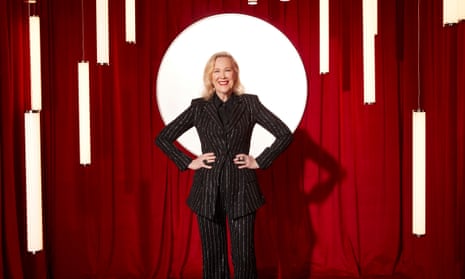Catherine O’Hara and I spend most of our time together anxiously apologising to one another, me for my terrible wifi connection, her for what she describes as her “ramblings”. Her infraction is more forgivable. A frozen Zoom screen is just annoying. O’Hara’s verbal meanderings (“Oh dear, what am I on about?”) are far more fun, swooping among the highlights from her career as a comedy cult star in the 1970s (the Canadian sketch show SCTV), 80s and 90s (Beetlejuice, Home Alone), and then Christopher Guest’s series of brilliant and largely improvised films (Waiting for Guffman, Best in Show, A Mighty Wind and For Your Consideration).
Now, at 66, she has peaked yet further, with her glorious performance as Moira Rose in Schitt’s Creek, the most endearing sitcom to come along in yonks. The show came to an end last year after six seasons and it went out with fireworks, setting the record for the most Emmys won by a comedy series in a single season. One went to O’Hara, almost 40 years after she won her first, for her writing on SCTV, in which she starred alongside John Candy, Harold Ramis and, most importantly, her Schitt’s Creek co-star Eugene Levy.
O’Hara and Levy have worked together for so long that it’s impossible to talk about the Emmys without mentioning something else they both starred in: For Your Consideration, the 2006 film about a bunch of actors desperately jockeying for an Oscar while making the unforgettably titled film Home for Purim. Did she and Levy quote lines from Home for Purim at each other when they got their nominations?
“Oh, you got my number,” O’Hara cackles from her home in Los Angeles. “Eugene and I, any time awards season – that holiest of seasons – comes up, we always [reference that film]. Writing your speech, just in case! That movie was a great reminder not to take it all too seriously.”
Still, sweeping the Emmys was a hoot, she concedes, despite all the masks and social distancing. As well as O’Hara, Levy and his son Daniel, who, along with his father created Schitt’s Creek, starred in it and wrote it, won Emmys, too. (In addition, they were all nominated for Golden Globes last week.) O’Hara has known Levy since the early 70s, and Daniel since he was born, and the love between the three of them was palpable, with Daniel hugging himself with delight when O’Hara got her Emmy award.
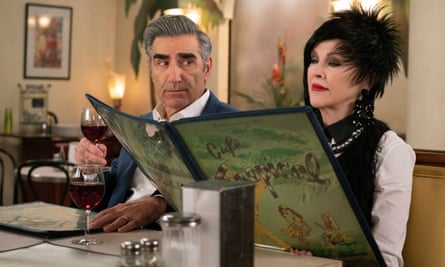
This sweetness infuses the show, and it is why audiences have cleaved to it over the past miserable year. The premise is a seemingly simple fish-out-of-water story: the Roses, a wealthy family, go bankrupt and are forced to relocate to the middle of nowhere and live in a depressing motel. O’Hara and Levy play the parents, narcissistic former soap actor Moira and sensible businessman Jonny, while Daniel plays their son David, all catty asides and inexplicable outfits, and their daughter, former It girl Alexis, is played by Annie Murphy. (Levy’s real daughter, Sarah, plays Twyla, who works in the local cafe.)
“It’s like the show was made for the pandemic: we were a family holed up together, forced to get to know each other, and in the Roses’ case, they ended up loving it. So maybe it can be a lesson in embracing the situation,” O’Hara says, gamely trying to get into PR work mode. (“My brain is definitely not in gear but the [bad] wifi gives me TIME to THINK,” she says, more than a bit Moira-ishly.)
Schitt’s Creek’s suitability for the current moment goes beyond mere plot. After a somewhat conventional first season, the show quickly became much warmer and weirder, with the warmth largely coming from the family’s deep love for one another and the weirdness largely coming from O’Hara. With her daily changing wigs (“my girls”), implausible couture wardrobe and similarly extraordinary vocabulary and intonations, Moira is unlike any other female sitcom character, let alone ones over 60 (typical Kris Jenner-esque parental advice from Moira: “Alexis, what have I told you about putting your body on the internet? Never without proper lighting!”). O’Hara largely constructed the character herself. She has been building her own characters since the 70s, when she worked at the famous improv theatre The Second City in Toronto, as did Levy.
“I have these emails Eugene and I exchanged early on, in which I said, ‘I’d like to inject big words into Moira’s vocabulary,’ and he said, ‘OK.’ Then I said, ‘I want her to wear these kinds of clothes,’ and he said, ‘OK.’ Then I said, ‘And I want her to wear a different wig every day,’ and he said, ‘Now hold on!’ In the emails, I can see me becoming Moira and him being Jonny,” she says, referring to Moira’s impracticality and Jonny’s steadiness. “But they made it all work for me.”
Instead of the jarring mix of aggression and sentimentality that characterises so many big US sitcoms, from Two and a Half Men to How I Met Your Mother, Schitt’s Creek maintains a more Canadian even keel, always spiky but always loving. O’Hara and Levy are both Canadian and the show started on Canada’s CBC TV before being picked up by Netflix. How would she define Canadian humour?
“We laugh at each other but we also laugh at ourselves, much like people in the UK and Ireland. You’re being made fun of by someone who you know loves you, so there’s sweetness, but an edge, and it means everything doesn’t have to be soft, because you know you’re safe. But the love in the show, that really comes from Danny and Eugene, because that’s the world Danny wants to live in, and so do I,” she says.
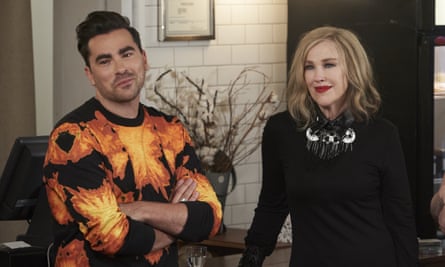
On the show, Moira and David love to do musical duets together, such as their Christmas medley at the town’s annual Asbestos Fest. I ask if it felt strange performing with Daniel when she’s done so many duets with his father, including the classic God Loves a Terrier from Best in Show.
“Actually, the Christmas medley was written as a solo piece, but I begged to do it with Daniel and he said yes right away. But Eugene – he’s so protective, he’s such a great father – he said: ‘I think you’re putting too much pressure on him: he’s already writing, producing and acting.’ And I said: ‘Come on, let him try!’ And, of course, Daniel shows up and it took him two minutes to get it. Sorry, I didn’t answer your question, but I did talk for a long time. Oh dear,” she says, with an embarrassed laugh.
Originally, Jonny and Moira weren’t supposed to be so fond of each other, but that changed quickly in rehearsal. O’Hara and Levy’s couples always have a real sweetness to them, whether they are the seemingly mismatched Gerry and Cookie Fleck in Best in Show, or the painfully broken-up Mickey and Mitch in A Mighty Wind. Does that reflect their friendship?
“I think it reflects Eugene! Martin Short and Eugene have been friends since university and Martin calls him Lambie, because he’s the sweetest man in the world. I don’t want to set the poor man up – he’s human, of course. But he’s one of the good guys,” she says.
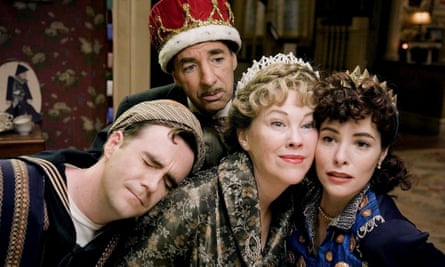
Levy’s awkward character in Best in Show was originally written as a single man, and O’Hara was pencilled in to play another character (rumoured to be the one eventually played by Jennifer Coolidge). “But I just didn’t have a handle on the character, unlike the person who then played it. So I asked in the meeting, ‘Eugene, can I be your wife?’”
So she proposed to him?
“I did, and he accepted,” she says faux-solemnly, then laughs.
O’Hara credits Levy’s kindness and thoughtfulness for their 40-plus years of collaboration. It also helped that they – as all Schitt’s Creek fans know – briefly dated when they were at Second City, but things never went further, so they could stay friends (“Thank heavens!”). In Guest’s films, a common joke is their physical disparity – O’Hara’s blond prettiness against Levy’s Jewish awkwardness. But in Schitt’s Creek, Levy is downright dashing and they have a rhythm and ease with one another that comes from knowing and liking one another for almost half a century.
“It’s always more fun working with someone you know. I get too nervous doing solo bits – it’s too much pressure and it feels like showing off. With someone else, you can share the showing off. Oh my, what am I going on about?” she says, tutting at herself, and I wish Levy were there to reassure her she is doing just fine.
O’Hara was born and raised in Toronto, the second-youngest of seven siblings. Her father worked for the Canadian Pacific Railway and loved to tell jokes, while her mother was a great mimic and storyteller. O’Hara didn’t realise she could be funny for a living until her brother Marcus brought home his new girlfriend, who just happened to be the future comedy legend Gilda Radner.
“Gilda would take me downtown and let me stay at her house, where I had pumpernickel toast with cream cheese and cucumbers, which I’d never had before. So exciting! Then she was cast in a production of Godspell, alongside Eugene, Martin Short – all these people who would become my friends. Then she got into Second City, and me and my sister Mary Margaret worked as waitresses there, so I got to see her every night. Living in the suburbs of Toronto, I never saw the possibility of theatre being a career. So Gilda really opened my eyes to the possibility of being silly for a career, and how to do it well. I would not have a career without her, God bless her,” she says.
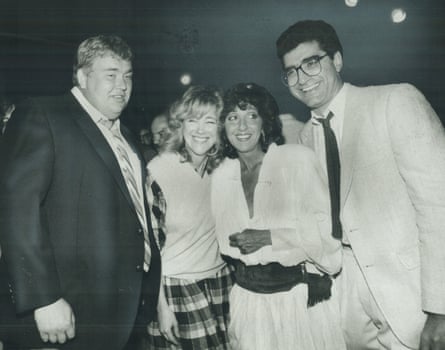
Mary Margaret went on to become an acclaimed singer-songwriter. O’Hara became Radner’s understudy and then starred on SCTV, Second City’s TV spin-off. She had small roles in a series of films before being cast as Delia, the talentless sculptor, in Beetlejuice, who in one scene is possessed by the ghosts and sings and dances to Harry Belafonte’s Banana Boat Song, her eyes looking bemused while her body grooves on. During the making of that film, O’Hara frequently groused to the director, Tim Burton, about the handsome production designer, Bo Welch, who never asked her out. Eventually, Burton said, “OK, I’ll have a word,” and Welch did as he was told. He and O’Hara are still happily married and have two sons.
People don’t tend to think of Burton as a romantic kinda guy, I say. O’Hara looks surprised: “But look at his movies! There is a real yearning there to be loved and find love. Oh yeah, he’s romantic for sure,” she says.
I tell her I can see certain similarities between Delia and Moira: the clothes, the pretensions, the misguided belief that they are both “artistes”. “Yes, Moira and Delia are definitely related. I’m always drawn to characters who have no idea of the impression they’re making on other people. We’re all delusional, really, and I love that about us humans and I love playing it,” she says.
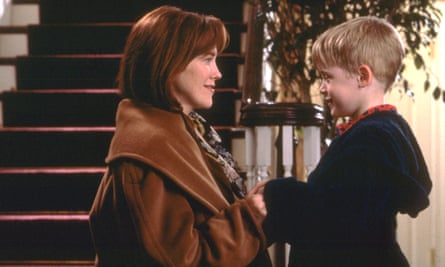
She was then cast as Kevin’s forgetful mother in Home Alone, written by John Hughes, and in one scene she rode in a van with her old SCTV colleague John Candy, who made a cameo appearance in the film. By this point, Candy had supplanted Molly Ringwald as Hughes’s muse and had made Planes, Trains and Automobiles and Uncle Buck with him. “John Candy and John Hughes were really in love with each other. They brought out the best in one another,” she says. “Candy was so busy we could only get him for 24 hours, so we sat in the van and improvised for at least 21 hours. John Hughes would go, ‘What if you did this?’ and John Candy would go, ‘Yeah! Yeah!’ They were so funny and crazy, but I had to play the straight man because any time I did a crazy thing [director] Chris Columbus would say: ‘I think the mom is supposed to be focused on finding her kid, not doing bits with a stranger in a van …’”
When O’Hara appeared in a recent tribute to Hughes, many Schitt’s Creek fans were astonished to realise the woman playing Moira and Kevin’s mom are the same person.
“Wasn’t that funny? It was fun to read the comments online but really, I never think of anyone knowing me from anything,” she says, looking mortified at the thought.
After that, O’Hara made Guest’s films and I tell her one of the things I love most about them is that the comedy is funny, but not cruel. You don’t feel the actors are sneering at the dog owners in Best in Show, or the folk singers in A Mighty Wind.
“Oh no, never! When you’re improvising from an honest place, you’re speaking on behalf of your characters; you’re not commenting on them. And also that’s Chris and Eugene [Guest and Levy, who co-created the films] – there’s no cruelty with them,” she says.
At this point, the wretched wifi freezes again and when it finally resolves itself, I decide I have to release her from my technological disasters. “OK, but please be merciful,” she says, anxiously. O’Hara made a name for herself playing characters with an inflated view of their greatness, but perhaps the secret to her enduring success is that she herself has exactly the opposite.
All six series of Schitt’s Creek are available on Netflix
